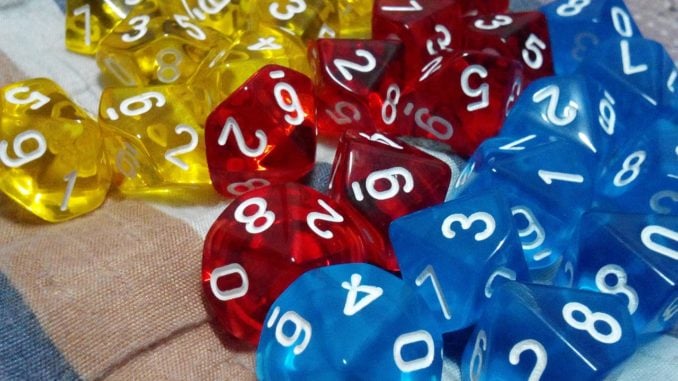
Orcs… Orcs are strange beasts. Introduced in Volo’s Guide to Monsters for Dungeons & Dragons 5th Edition, Orcs are the war-based people of Toril. They are grey-skinned, burly, muscle-bound creatures, born in the blood of their god and raised to seek nothing but bloodshed.
However, their strangeness comes in the releases of Eberron: Rising from the Last War… and the Explorer’s Guide to Wildemont. In these books, Orcs lost their god-based spirit, and instead applied a more primal twist. These orcs are almost druidic in nature; still religious, but no longer under the watchful eyes of their more malevolent gods. Despite their multiple versions of themselves, Orcs tend to stick to a rather simple naming structure. Learn it with our Orc Names Guide!
Table of Contents
Orc Names 5E Guide
Orc name generators tend to focus on Tolkien’s orcs which… yeah, those are fair game. But, if you really want to make your Orc feel like a living, breathing entity, it’s important to know their culture. The conventions of why they are named is why their names are so simple; if your orc is an outcast, they will likely change their name, for better or worse.
How Are Orcs Named?
Orcs are constantly warring. They know no peace, and will find trials to test their strength whenever possible. As such, Orcs are also constantly reproducing to sustain their numbers. Orcs don’t create any meaningful relationships in their tribes because of this constant cycle, and their nomadic nature.
Deeply religious, Orcs are known for their loyalty to whatever god they serve; Gruumsh, Yurtrus, Shargaas, or Luthic. Gruumsh is the god of war and what Orcs are sculpted around. Yurtus and Shargaas are the gods of elderly or injured orcs, as they are the gods of fear and disease. Luthic is the sole goddess, and represents the life and the grave; the caretaker of the orcish people. These gods bicker somewhat constantly over their warrior race.
Their religiousness creates superstition. An orc from a warband assaulted by spellcasters may see books as blasphemous or eerie. A Gruumsh-focused war wagon may think of elf ears as a worthy sacrifice to Gruumsh.
In Eberron and Wildemount, Orcs do change… if only slightly. They’re still warriors, but their blood-fuelled rampaging is replaced with a want to prove themselves. They’re thoughtful and unique outside of Gruumsh’s grasp, naturally becoming shamans or druids. You can find this in their stats; they lose the -2 to Intelligence that Volo’s Guide gave to them, and gain better skill proficiencies.
Perhaps the most important thing to know about Orcs – in all nations – is their language. They have no written language beyond symbols that tell each other exactly what they need to know at the time. Their actual language is guttural and growly, focused on quick words to give information. That is where orc’s basic names originate from; basic, quick, guttural sounds, likely easier to hear from shouts over a battlefield.
See Also: Necromancer Names Guide
Examples of Orc Names
Because of this, orc names are extremely simple; typically 1 to 3 syllables. Male names make use of Us, Zs, Ts, and Gs – hard consonants – to sound more fierce and respectable. Female names are softer; As, Ms, Ss, and Es. While not a hard limitation, you will likely be able to tell a male name from a female just from hearing it said out loud.
Male Orc Names
- Grutok
- Lortar
- Abzug
- Shugog
- Urzul
- Ruhk
- Skalslag
- Mobad
- Onogh
- Urul
- Vrothu
- Shamog
- Mugrub
- Bajok
- Rhorog
- Jahrukk
Female Orc Names
- Kansif
- Ownka
- Emen
- Sutha
- Myev
- Neega
- Baggi
- Shautha
- Vruhag
- Supaugh
- Olaghig
- Ovak
- Vola
- Engong
- Volen
Epithets
Orcs obtain epithets by performing fantastically in battle. These are more like titles, and stick to a more common language.
- The Filthy
- Skull Cleaver
- Eye Gouger
- Iron Tusk
- Skin Flayer
- Bone Crusher
- Flesh Ripper
- Doom Hammer
- Elf Butcher
- The Gory
- Spine Snapper
- Death Spear
- The Brutal
Out-of-Tribe
Before we end this guide, it should be noted that orcs raised from without their tribe develop compassion. They change quite a bit, showing that orcs are not naturally evil; simply warlike, always wanting to test their strength. Therefore, orcs raised out of their tribes – especially orcs from Eberron or Wildemount, who are more primal and self-focused – typically use titles or nicknames to describe themselves. If you’re especially interested in Wildemount orc variants, check out our guide to Wildemount’s races and subraces.




Be the first to comment